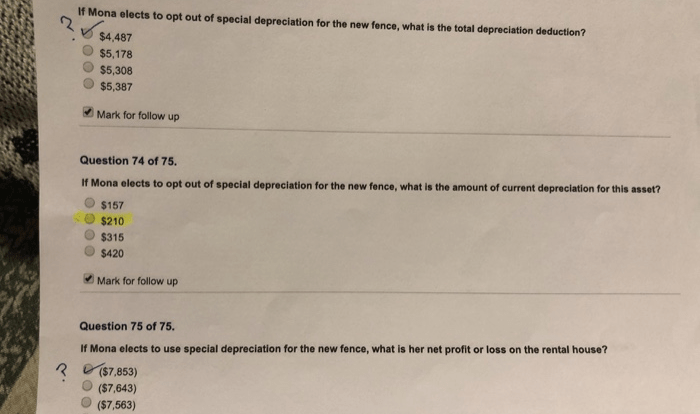Embark on a journey to conquer Unit 6 Progress Check MCQ Part A with this captivating guide. Dive into the intricacies of the assessment, master effective preparation strategies, and uncover valuable tips to excel in this crucial exam.
This comprehensive resource provides an in-depth analysis of the MCQ’s structure, question types, and difficulty levels. It also explores the key concepts and topics covered, ensuring a thorough understanding of the content assessed.
Understanding Unit 6 Progress Check MCQ Part A
Unit 6 Progress Check MCQ Part A is an assessment tool designed to evaluate your understanding of the key concepts covered in Unit 6. It consists of multiple-choice questions that test your knowledge and comprehension of the unit’s material.
The MCQ is structured to cover a wide range of topics within Unit 6, including concepts, theories, and applications. The questions are carefully crafted to assess your ability to apply your knowledge to practical scenarios and demonstrate your understanding of the underlying principles.
Purpose and Significance
The primary purpose of Unit 6 Progress Check MCQ Part A is to:
- Provide you with an opportunity to assess your progress and identify areas where you may need additional support.
- Help you prepare for the final assessment by providing practice with MCQ-style questions.
- Encourage you to engage with the unit’s content and reinforce your understanding of the key concepts.
Analyzing Question Types and Difficulty Levels
Understanding the question types and difficulty levels in the MCQ can help you develop effective test-taking strategies. This section will identify the different types of questions and describe their distribution based on difficulty.
Question Types
- Knowledge questionstest your understanding of basic concepts and facts.
- Comprehension questionsrequire you to understand the meaning of a passage or information.
- Application questionsask you to apply your knowledge to new situations or solve problems.
- Analysis questionsrequire you to break down information into its component parts and understand their relationships.
- Evaluation questionsask you to make judgments about the information provided.
Difficulty Levels
The questions in the MCQ are classified into three difficulty levels:
- Easy questionsare typically straightforward and require only basic knowledge.
- Medium questionsrequire a deeper understanding of the material and may involve some analysis.
- Hard questionsare challenging and may require you to apply multiple concepts or solve complex problems.
The distribution of questions based on difficulty is typically as follows:
- Easy questions:50%
- Medium questions:30%
- Hard questions:20%
Content and Scope of the MCQ
The MCQ in Unit 6 Progress Check Part A comprehensively evaluates students’ understanding of key concepts and topics covered in the unit. It delves into the depth and breadth of the content, assessing students’ grasp of both fundamental principles and more intricate details.
Key Concepts and Topics
The MCQ covers a wide range of key concepts and topics, including:
- The concept of a function and its properties
- Different types of functions, such as linear, quadratic, and exponential functions
- Graphing functions and interpreting their characteristics
- Solving equations and inequalities involving functions
- Applications of functions in real-world scenarios
Depth and Breadth of Content
The MCQ assesses students’ understanding of the content at varying levels of depth and breadth. Some questions focus on foundational concepts, ensuring that students have a solid grasp of the basics. Other questions delve into more advanced topics, challenging students to apply their knowledge to more complex situations.
By assessing both depth and breadth of content, the MCQ provides a comprehensive evaluation of students’ progress in Unit 6.
Preparation Strategies and Tips
To excel in Unit 6 Progress Check MCQ Part A, it’s crucial to adopt effective preparation strategies. One key step is to thoroughly review your course materials, paying particular attention to the concepts and topics covered in the MCQ. This will provide you with a solid foundation and enhance your understanding of the subject matter.
Practice Sample Questions
Engaging in practice questions is another essential preparation strategy. Solving sample MCQs will familiarize you with the question formats, difficulty levels, and types of questions you can expect in the actual assessment. It helps you identify areas where you need further reinforcement and allows you to refine your problem-solving skills.
Time Management and Test-Taking Techniques
Time management is crucial for completing the MCQ section effectively. It’s essential to allocate time wisely, ensuring you answer all questions within the allotted time frame. One effective strategy is to allocate a specific amount of time to each question, adjusting it based on the difficulty level and length of the question.
Efficient Question Answering Techniques
Different types of questions require specific techniques for efficient answering. For multiple-choice questions, read the question carefully and eliminate options that are clearly incorrect. For true/false questions, focus on identifying the key concept and whether it is accurately represented in the statement.
For fill-in-the-blank questions, recall the relevant information and fill in the missing word or phrase.
Overall, effective time management and test-taking techniques are essential for maximizing your performance in the MCQ section of the Progress Check.
Sample Questions and Solutions
To familiarize yourself with the format and content of the MCQ, let’s explore a selection of sample questions with detailed solutions and explanations.
Question 1
Which of the following is NOT a characteristic of a good research question?
- It is specific and focused.
- It is answerable with the available resources.
- It is not already answered by existing research.
- It is complex and multifaceted.
Solution:D. It is complex and multifaceted. A good research question should be specific and manageable, not overly broad or complex.
Question 2
What is the difference between a hypothesis and a theory?
- A hypothesis is a specific prediction, while a theory is a general explanation.
- A theory is more specific than a hypothesis.
- A hypothesis is based on evidence, while a theory is not.
- A hypothesis can be tested, while a theory cannot.
Solution:A. A hypothesis is a specific prediction, while a theory is a general explanation.
Assessment and Evaluation
The MCQ is assessed based on the accuracy of the responses. Each correct answer is awarded a specific number of points, and the total score is calculated by summing the points obtained for all correct answers.
Criteria for Assessment, Unit 6 progress check mcq part a
- Content Accuracy:The responses must accurately reflect the knowledge and understanding of the concepts covered in Unit 6.
- Clarity and Precision:The responses should be clear, concise, and unambiguous, demonstrating a thorough understanding of the topic.
- Relevance:The responses should be relevant to the questions asked and demonstrate an ability to apply knowledge to specific situations.
Using Results for Improvement
The results of the MCQ can be used to identify areas where students may need additional support or reinforcement. By analyzing the incorrect responses, educators can determine specific concepts or skills that require further clarification or practice.
This information can then be used to tailor future instruction, provide targeted interventions, and develop individualized learning plans to address the identified areas for improvement.
FAQ Explained: Unit 6 Progress Check Mcq Part A
What is the purpose of Unit 6 Progress Check MCQ Part A?
To assess your understanding of key concepts and topics covered in Unit 6.
How many types of questions are there in the MCQ?
Multiple types, including multiple choice, true/false, and short answer.
What is the best way to prepare for the MCQ?
Review course materials, practice sample questions, and identify areas for improvement.

